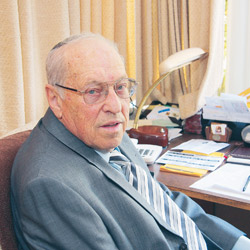Remembering the Dunera Boys
A NEW exhibition marks the 70th year of the arrival of the Dunera Boys in Australia from war-torn Europe.
LEXI LANDSMAN
A BLACK and white image shows a group of men, well dressed in suits, brandishing big smiles as they huddle together in a small hall.
Dated 1963, the photograph captures the first reunion of the wartime internees who arrived in Sydney on the military transport ship Dunera.
It’s a far cry from their entry to Australia two decades earlier, when more than 2500 German, Austrian and Italian internees, who were to become known as the Dunera Boys, arrived from Britain.
The photograph is among the items that are being exhibited at the National Library in Canberra in a special collection-in-focus exhibition marking the 70th anniversary year of the arrival of the Dunera Boys and their contribution to Australia.
Many of the internees were of Jewish heritage and had escaped to Britain from Nazi Germany in the 1930s, only to be interned as enemy aliens in camps in Britain in mid-1940, and then transferred to camps in rural Australia.
For Dunera Boys like Melbourne-based Erwin Lamm, the exhibition is chance to reflect on their momentous journey to freedom and the hardships along the way.
“It changed our lives completely,” Mr Lamm, 89, reflects. “It brought us to Australia, which in a way was a blessing. Certainly we haven’t forgotten it. It’s good it’s being brought to public notice again.”
But marking the seven decades since the Dunera arrived in Australia has also conjured up some harrowing memories for Mr Lamm, who lost his family during the Holocaust.
“It was very unpleasant, unjust, [there was] no sense to say we should be interned … but at the same time, bearing in mind what happened in the rest of the world, to our people and my parents and so forth, we don’t complain about it because it’s minor to what happened over there.”
Mr Lamm recalls being among a group of some 200 Jewish interns who overcame many challenges in order to maintain their Jewish traditions.
“We tried to stick to kashrut. The group kept Shabbat and had kosher food. So whatever difficulties and circumstances we found in our lives, we had to keep to our culture and our way of life and wait until good times came again.”
Good times did indeed come for Mr Lamm. Now with a large family — he has two children, six grandchildren, three great-grandchildren and another one on the way — Mr Lamm says despite the unpleasant journey, he is proud to call Australia home.
“I am happy to be in Australia now,” he enthuses. “I’m happy that I met my wife here and that I have a wonderful family who follow on the same traditions my parents would have wanted us to keep.”
Mr Lamm has donated a photo to the exhibition, which will be among the many objects that celebrate the Dunera Boys’ significant contribution to Australian society.
Most of the items in the exhibition are drawn from the National Library’s growing collection of prints, drawings, manuscripts, newspapers, books and music. Visitors will have the opportunity to hear excerpts from unique oral histories recorded by some of the 850 internees who chose to stay in Australia. Much of the material has never been exhibited before.
The Dunera Boys: Seventy Years On is showing at the Visitor Centre, National Library of Australia, Canberra. Enquiries: (02) 6262 1111.


comments